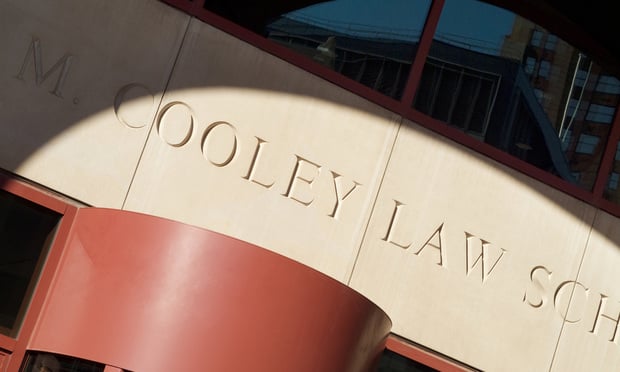Once the Nation's Largest Law School, Cooley Set to Close a Campus and Slash Tuition
Western Michigan University Cooley Law School aims to close its Auburn Hills satellite campus by the end of 2020, while also cutting tuition 21% in a bid to comply with the ABA's new bar pass standard. A number of lower-tier law schools have closed in recent years amid enrollment declines.
August 30, 2019 at 01:08 PM
4 minute read
 Western Michigan University Cooley Law School Lansing campus. Courtesy photo.
Western Michigan University Cooley Law School Lansing campus. Courtesy photo.
The Thomas M. Cooley Law School was once the largest in the country, with more than 4,000 students spread across its four Michigan campuses in 2010.
Today, what's now called Western Michigan University Cooley Law School (it affiliated with the Kalamazoo university in 2014) has a student body that's about a quarter of that size and is retrenching in a bid to stay viable in a very different legal education market. Law school officials announced this week that they are seeking to close a satellite campus in Auburn Hills, Michigan, while slashing tuition by 21%. They also plan to consolidate the school's main campus in Lansing.
Cooley is among the growing number of lower-tiered law schools that have struggled with enrollment declines, bar passage rates, and postgraduate employment—a handful of which have closed in recent years.
The tuition reduction, which takes effect next fall, will lower the cost of a credit hour from $1,750 to $1,375. That will cut annual tuition by about $10,600, from approximately $52,000 to about $40,000.
 James McGrath
James McGrathCooley president and dean James McGrath said in an interview Friday that the purpose of the tuition cut is not necessarily to increase the size of the student body; rather, it's meant to attract a stronger pool of applicants. Administrators were concerned that the school would not meet the tougher bar passage standard adopted by the American Bar Association this year, he said. (That new standard mandates that at least 75% of a law school's graduates pass the bar exam within two years.) Moreover, the current tuition is significantly higher than at the schools with which Cooley competes for students, he said.
"Having the highest price in the group of schools from which we compete really doesn't make us look like the access school we are," said McGrath, noting that Cooley has one of the most diverse law student bodies in the country. "It really helps realign our focus and mission. And the closing of the [Auburn Hills] campus will help us more efficiently run the school."
Cooley is seeking permission from the ABA to close its Auburn Hills campus, where 231 students now attend. The plan calls for that campus to remain open through December 2020 and for current students to receive individualized counseling on where to complete their degrees.
Cooley is just one law school struggling recently. Valparaiso University School of Law is in the process of closing, while Thomas Jefferson School of Law did not admit any new students this fall as it fights for survival. Worse still, Indiana Tech Law School, Charlotte School of Law, Arizona Summit Law School and Whittier Law School all have closed since 2016. Many of those schools enrolled relatively high percentages of minority and nontraditional students, as does Cooley.
Current students at Cooley's Auburn Hills campus could potentially finish their degrees through online classes or externships, so they wouldn't have to relocate, McGrath said. Auburn Hills is outside of Detroit, and about a 90-minute drive from Cooley's main campus in Lansing. The school's board has not yet reached any decision about resulting faculty reductions.
It's not the first time the school has shut down one of its satellite campuses. It closed a campus in Ann Arbor in 2014 due to low attendance. Meanwhile, the school opened a satellite campus in Tampa Bay in 2012 and began offering classes at the Western Michigan University campus in Kalamazoo following the 2014 affiliation.
The growth of programming in Kalamazoo prompted Cooley to experiment with the offerings at its Grand Rapids campus this year. That campus is not holding any first-year courses this semester as a test to see if more new students would enroll at Kalamazoo as a result. But eliminating Grand Rapids as an option for new students had little impact on enrollment at Kalamazoo, McGrath said, and no resulting changes are planned in Grand Rapids as a result. It will once again offer first-year courses in the spring and there are no plans to close the Grand Rapids campus, he said.
Plans for consolidating the main Lansing campus are still being worked out, but that location has excess capacity given the decline in enrollment over the past decade, according to McGrath.
This content has been archived. It is available through our partners, LexisNexis® and Bloomberg Law.
To view this content, please continue to their sites.
Not a Lexis Subscriber?
Subscribe Now
Not a Bloomberg Law Subscriber?
Subscribe Now
NOT FOR REPRINT
© 2025 ALM Global, LLC, All Rights Reserved. Request academic re-use from www.copyright.com. All other uses, submit a request to [email protected]. For more information visit Asset & Logo Licensing.
You Might Like
View All
University of Chicago Accused of Evicting Student for Attending Gaza-Israel Protest
3 minute read
Sanctioned Penn Law Professor Amy Wax Sues University, Alleging Discrimination
5 minute read

The Met Hires GC of Elite University as Next Legal Chief
Trending Stories
- 1Meta Workers Aren't of One Mind on Company's Retreat From DEI, Fact-Checking
- 2The Gloves Are Off in the Battle for Top Partner Talent
- 3RFK Jr. Will Keep Affiliations With Morgan & Morgan, Other Law Firms If Confirmed to DHHS
- 4BOI Reports: What Business Owners and Attorneys Should Know
- 5SurePoint Acquires Legal Practice Management Company ZenCase
Who Got The Work
J. Brugh Lower of Gibbons has entered an appearance for industrial equipment supplier Devco Corporation in a pending trademark infringement lawsuit. The suit, accusing the defendant of selling knock-off Graco products, was filed Dec. 18 in New Jersey District Court by Rivkin Radler on behalf of Graco Inc. and Graco Minnesota. The case, assigned to U.S. District Judge Zahid N. Quraishi, is 3:24-cv-11294, Graco Inc. et al v. Devco Corporation.
Who Got The Work
Rebecca Maller-Stein and Kent A. Yalowitz of Arnold & Porter Kaye Scholer have entered their appearances for Hanaco Venture Capital and its executives, Lior Prosor and David Frankel, in a pending securities lawsuit. The action, filed on Dec. 24 in New York Southern District Court by Zell, Aron & Co. on behalf of Goldeneye Advisors, accuses the defendants of negligently and fraudulently managing the plaintiff's $1 million investment. The case, assigned to U.S. District Judge Vernon S. Broderick, is 1:24-cv-09918, Goldeneye Advisors, LLC v. Hanaco Venture Capital, Ltd. et al.
Who Got The Work
Attorneys from A&O Shearman has stepped in as defense counsel for Toronto-Dominion Bank and other defendants in a pending securities class action. The suit, filed Dec. 11 in New York Southern District Court by Bleichmar Fonti & Auld, accuses the defendants of concealing the bank's 'pervasive' deficiencies in regards to its compliance with the Bank Secrecy Act and the quality of its anti-money laundering controls. The case, assigned to U.S. District Judge Arun Subramanian, is 1:24-cv-09445, Gonzalez v. The Toronto-Dominion Bank et al.
Who Got The Work
Crown Castle International, a Pennsylvania company providing shared communications infrastructure, has turned to Luke D. Wolf of Gordon Rees Scully Mansukhani to fend off a pending breach-of-contract lawsuit. The court action, filed Nov. 25 in Michigan Eastern District Court by Hooper Hathaway PC on behalf of The Town Residences LLC, accuses Crown Castle of failing to transfer approximately $30,000 in utility payments from T-Mobile in breach of a roof-top lease and assignment agreement. The case, assigned to U.S. District Judge Susan K. Declercq, is 2:24-cv-13131, The Town Residences LLC v. T-Mobile US, Inc. et al.
Who Got The Work
Wilfred P. Coronato and Daniel M. Schwartz of McCarter & English have stepped in as defense counsel to Electrolux Home Products Inc. in a pending product liability lawsuit. The court action, filed Nov. 26 in New York Eastern District Court by Poulos Lopiccolo PC and Nagel Rice LLP on behalf of David Stern, alleges that the defendant's refrigerators’ drawers and shelving repeatedly break and fall apart within months after purchase. The case, assigned to U.S. District Judge Joan M. Azrack, is 2:24-cv-08204, Stern v. Electrolux Home Products, Inc.
Featured Firms
Law Offices of Gary Martin Hays & Associates, P.C.
(470) 294-1674
Law Offices of Mark E. Salomone
(857) 444-6468
Smith & Hassler
(713) 739-1250








